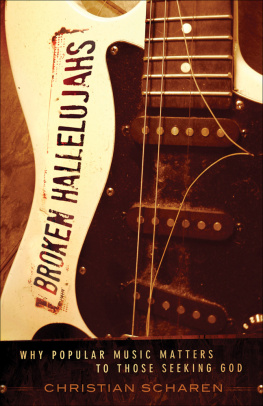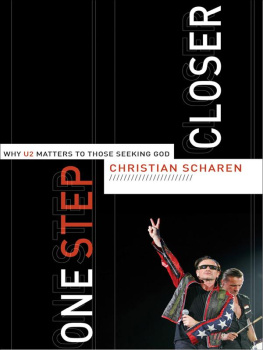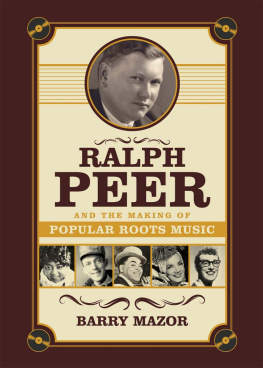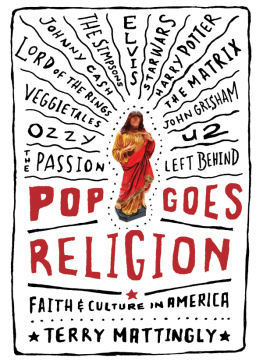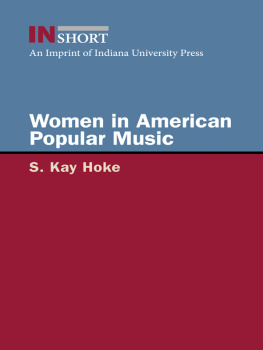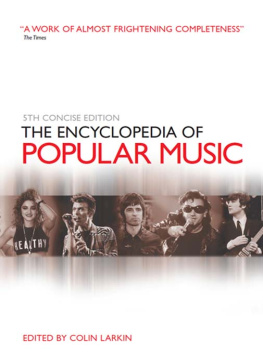
2011 by Christian Scharen
Published by Brazos Press
a division of Baker Publishing Group
P.O. Box 6287, Grand Rapids, MI 49516-6287
www.brazospress.com
Ebook edition created 2011
All rights reserved. No part of this publication may be reproduced, stored in a retrieval system, or transmitted in any form or by any meansfor example, electronic, photocopy, recordingwithout the prior written permission of the publisher. The only exception is brief quotations in printed reviews.
ISBN 978-1-4412-3443-8
Library of Congress Cataloging-in-Publication Data is on file at the Library of Congress, Washington, DC.
Unless otherwise indicated, scripture quotations are from The Message by Eugene H. Peterson, copyright 1993, 1994, 1995, 2000, 2001, 2002. Used by permission of NavPress Publishing Group. All rights reserved.
Scripture quotations marked NRSV are from the New Revised Standard Version of the Bible, copyright 1989, by the Division of Christian Education of the National Council of the Churches of Christ in the United States of America. Used by permission. All rights reserved.
Scripture quotations marked NIV are from the Holy Bible, New International Version. NIV. Copyright 1973, 1978, 1984, 2011 by Biblica, Inc. Used by permission of Zondervan. All rights reserved worldwide. www.zondervan.com
to
Timothy F. Lull
and
Don E. Saliers
The primary impulse of each is to maintain and aggrandize himself. The secondary impulse is to go out of the self, to correct its provincialism and heal its loneliness. In love, in virtue, in pursuit of knowledge, and in the reception of the arts, we are doing this. Obviously this process can be described either as an enlargement or as a temporary annihilation of the self. But that is an old paradox; he that loseth his life shall save it.
C. S. Lewis, An Experiment in Criticism
He called the crowd with his disciples, and said to them, If any want to become my followers, let them deny themselves and take up their cross and follow me. For those who want to save their life will lose it, and those who lose their life for my sake, and for the sake of the gospel, will save it.
Mark 8:3435


I had to laugh when I sat down to tackle this last lovely task of giving thanks. I had finished a book on imagination, pop culture, and God, now four years in the making, accruing many debts in that time. The first thing that popped into my head was the last hit single released by ABBA, the Swedish pop foursome, titled Thank You for the Music. The song is very nearly a prayer and gives heartfelt thanks for the joy that comes from the singing, the songs, and the music. Indeed, to paraphrase their question in the lyric, who could live without it? What would this life be were we not able to sing and dance? So I begin with thanks to God, whose creative and loving life opened time and space for the creation of the cosmos, for our lives, and for the beautiful gift that is music. As well, thanks for all the musicians and artists whose work blesses my life, stretches my imagination, and tutors me in the full stretch of living.
I learned that little phrase the full stretch of living from Don Saliers, my teacher and mentor while I was in graduate school at Emory University. On his door he had a sign quoting St. Irenaeus of Lyons, who said, The glory of God is humanity fully alive. Don, a gifted theologian and musician himself, has both jazz and blues in his background as well as classical musical training. With his daughter, Emily (one-half of the folk music duo the Indigo Girls), Don has lived and written beautifully about the intersections of faith and pop music, sacred and secular. Another teacher and mentor, Tim Lull, who died tragically at age sixty in 2003, regularly engaged with pop culture and music in his teaching, even lecturing in his black boots and leather jacket on days he was attending a rock-and-roll show with one of his sons. To both of these men I owe deep gratitude.
Many other people and places have welcomed me as I thought through these arguments. First, thanks to Barney Cochran and Ron Wright for inviting me to give the Imagination and the Kingdom of God lecture at Mount Vernon Nazarene University. Neither you nor I had any idea that your invitation would lead to this book! I hope it comes as a blessing and an encouragement to the vital and faithful work you pursue there.
At Brazos Press, Rodney Clapp believed in my ideas and exercised patience as I dragged the project from New Haven to St. Paul. That move added years to the writing time, no doubt, but as contractual deadlines came and went, Rodney stayed the course. I deeply value his editorial wisdom and sage insights on popular culture. My thanks to the Brazos production and marketing staff as well, especially Lisa Ann Cockrel, whose prodding and questions strengthened the whole book.
Thanks also to Holden Village, Camp Arcadia, the Nebraska Synod (ELCA) and Midland University, the ELCA Youth Extravaganza, and many congregations where I have presented some of these ideas. The long delay in publishing the book is mostly due to my transition from Yale Divinity School and its Center for Faith and Culture to my present position at Luther Seminary. Yet the provocative questions and conversations in these many settings forced new thinking and further work on my part. Thanks to all.
Particular friends and colleagues have offered help and inspired my thinking. To Yale colleagues Miroslav Volf, Carolyn Sharp, Martin Jean, and Siobhan Garrigan (now at the University of Exeter), thank you. To Luther colleagues Eileen Campbell-Reed, Mary Hess, Dirk Lange, David Lose, Andy Root, Dick Nysse, and Dwight Zscheile, along with Dean Roland Martinson, thank you. Teaching alongside you and discussing these and many related issues deepened my work and inspired my writing. Other scattered friends have been key encouragers of this work: the Collegeville Group (Ted Smith, Dorothy Bass, Bonnie Miller-McLemore, Jim Nieman, Kathleen Cahalan, and John Witvliet), Tom Beaudoin, Pete Ward in the UK, and Alan Storey in South Africa. I am particularly grateful for Ted Smiths invitation to think through the ways particular book projects shape us as persons. I think this book has, more than anything Ive written, changed me for the better. Finally, a special thanks to two outstanding research assistants, Jeni Falkman Grangaard and Peter Speiser, whose love of pop music and theology led to many great conversations. Likewise, thanks to Catrina Ciccone, who worked with me on final edits and put together the indexes. I learned from all these colleagues, and the book is much better for their presence in my life.
Last, a brief word of thanks is due to Sonja, my partner and spouse, and my two children, Isaiah and Grace. Actually, no mere word of thanks would do for the ways they have loved me in spite of my many faults. Perhaps the phrase we all learned in Scandinavia during a recent summer trip is better: tusen takk . The book not only would have been worse without the joy you bring to my life; it wouldnt have been at all.

Help, Godthe bottom has fallen out of my life!
Master, hear my cry for help!
Next page
